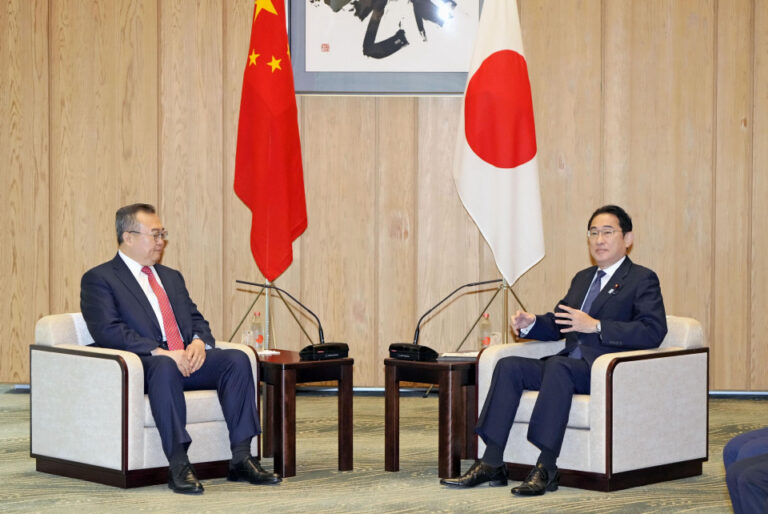Japan’s Foreign Ministry said Prime Minister Fumio Kishida and Chinese Communist Party diplomat Liu Jianchao agreed on Wednesday on the importance of continuing bilateral dialogue as the two countries seek to stabilize ties despite differences over regional security issues and other issues.
“We hope that through dialogue we can make progress on bilateral issues and concerns and accelerate mutually beneficial cooperation,” Kishida reportedly told the Communist Party’s international affairs director during their meeting in Tokyo.

Prime Minister Fumio Kishida (right) meets with Liu Jianchao, head of the International Liaison Department of the Communist Party of China, at the Prime Minister’s Office in Tokyo on May 29, 2024. (Kyodo)
According to the ministry, Liu expressed his hope to promote exchanges between Chinese and Japanese political parties to improve and develop Japan-China relations.
After the meeting, a senior Chinese official told reporters that he and Foreign Minister Kishida “agreed to continue high-level exchanges.”
Liu later met with Japanese Foreign Minister Yoko Kamikawa, who began the meeting by saying she hoped to arrange mutual visits between the foreign ministers to advance discussions on outstanding issues between the two countries.
Liu’s visit to Japan, his first since assuming his current role in 2022, came after Foreign Minister Kishida and Chinese Premier Li Qiang held bilateral talks in Seoul on the sidelines of a trilateral summit with South Korea on Sunday, the first such meeting involving the leaders of the three countries in more than four years.
Unresolved issues between Japan and China include Beijing’s increased military activity in regional waters, including near Taiwan, and a dispute over Japan’s release of treated radioactive water from the Fukushima Daiichi nuclear plant into the Pacific Ocean.
The ministry said Liu told Kishida that Japan should abide by the “one China” principle, which considers Taiwan an inalienable part of China, and called for “proper” disposal of what Beijing calls “nuclear-contaminated water.”
China has imposed a blanket ban on all imports of Japanese seafood since the releases of the treated water began last year, but Japan has called on Beijing to lift the restrictions immediately, saying the releases are being carried out safely.
China also conducted two days of military drills until Friday around Taiwan following the inauguration last week of Taiwan’s new President, Lai Ching-te, whom Beijing denounces as a separatist.
Liu also met on Wednesday with Japanese lawmakers including Motegi Toshimitsu, secretary-general of Kishida’s Liberal Democratic Party, Yamaguchi Natsuo, leader of the LDP’s ruling coalition partner Komeito, and Izumi Kenta, leader of the main opposition Constitutional Democratic Party.
During his meeting with Motegi, Liu proposed resuming regular consultations between China’s Communist Party and Japan’s ruling party. Such talks were last held in 2018, and Motegi agreed to the proposal, according to Tatsuya Ito, a Liberal Democratic Party lawmaker who accompanied him.
Related article:
Focus: Another deterioration in Japan-South Korea relations could put Asian security at risk
Economic organizations from Japan, South Korea and China consider cooperation
Foreign Minister Kishida conveys concern over China’s military actions

